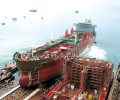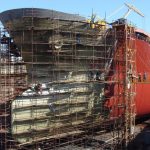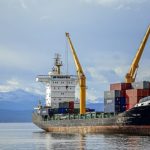South Korea’s three biggest shipbuilders lost their world’s No. 1 title in ship orders for the second consecutive year but still proved they are the dominant players in the more profitable liquefied natural gas (LNG) carrier segment.
According to market researcher Clarkson Research Service, the “Big Three,” – Korea Shipbuilding & Offshore Engineering Co. (KSOE), Daewoo Shipbuilding & Marine Engineering Co. (DSME) and Samsung Heavy Industries Co. – clinched a combined 15.64 million compensated gross tons (CGTs) in new orders this year, accounting for 37% of the 41.93 million CGTs ordered worldwide.
Based on their annual performance, which is an 11% decrease from the previous year, Korean shipyards ranked second following their Chinese rivals, which retained their market leadership status for two years running with 20.34 million CGTs in new orders, or 49% of the global total.
CGT measures the amount of work required to construct ships.
Korea had retained the world’s No. 1 spot in new shipbuilding orders for three years running before falling behind China.
Industry watchers said China, the world’s second-largest economy, was able to retain its market leadership boosted by strong orders from its own shipping companies.
MORE PROFITABLE WITH HIGH TECHNOLOGICAL BARRIERS
Korean companies have for years sought orders for more expensive vessels such as LNG carriers. In the relatively low-priced tanker and container ship market, Korean shipbuilders fiercely compete with Chinese rivals, which usually offer lower pricing.
Construction of LNG carriers is also a segment where Korean shipyards have a technological edge over rivals.
Data showed Korean shipbuilders won 10.12 million CGTs of LNG carrier orders this year, accounting for 70% of the global total of 14.52 million CGTs, which represented a 130% increase from the year prior.
Chinese shipyards took the remaining 4.4 million CGTs with their market share reaching 30%.
Korea’s 2022 LNG carrier market share was down from the previous year’s 93% while China’s percentage grew from a mere 7%.
Analysts said clients who wanted a quick delivery of LNG ships placed orders with Chinese shipbuilders this year as Korean shipyards are fully booked for years.
“Korea’s three big shipbuilders hardly have room to take more orders as their dockyards are almost fully booked for ships scheduled for delivery by the end of 2026,” said an industry official.
For Korean shipbuilders, LNG carriers accounted for 65% of their shipbuilding contracts in 2022, followed by container ships at 27% or 4.26 million CGTs.
None of the Big Three has clinched a bulker order this year.
In contrast, container ships accounted for 33% of China’s total shipbuilding orders with 6.76 million CGTs, followed by 4.4 million CGTs of LNG carriers (22%) and 3.32 million CGTs of bulk carriers (16%).
Analysts said the high ratio of LNG carriers in Korean shipbuilders’ portfolio will help boost their profits.
Korean shipbuilders have been in the red, weighed by the dwindling seaborne traffic since the outbreak of the COVID-19 pandemic.
Amid growing post-pandemic cargo traffic across the world, however, new shipbuilding prices are also on an upswing, which bodes well for Korean shipyards, industry officials said.
Source: Hellenic Shipping News





